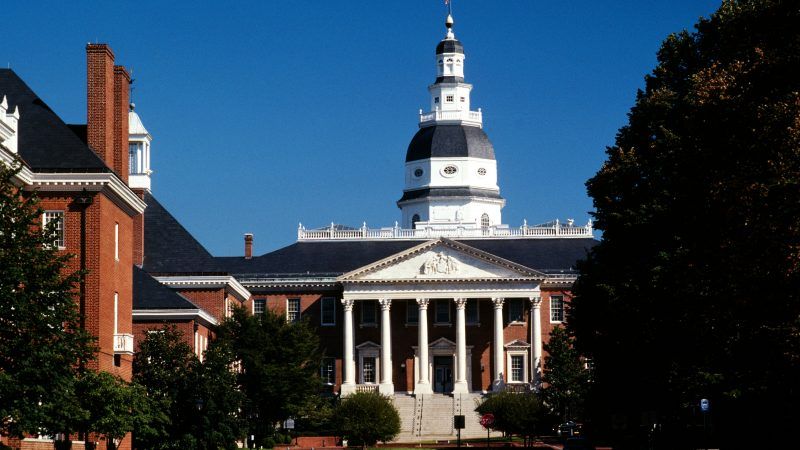Maryland's Legislature Just Imposed a New Tax on Digital Advertising by Overriding Gov. Larry Hogan's Veto
The first-in-the-nation tax is an expensive and regressive policy that's also possibly unconstitutional.

Legislators in Maryland voted Friday to override Gov. Larry Hogan's veto and impose America's first tax on digital advertising, a regressive policy that aims to squeeze revenue out of big tech companies but will likely only hurt small businesses—that is, if it survives near-certain legal challenges to its constitutionality.
The new law will impose taxes between 2.5 percent and 10 percent on digital ads targeting Marylanders, with the exact rate to be based on the advertiser's gross revenue. The state expects to generate about $250 million annually from the new tax, but those costs will likely be passed along to companies in Maryland that buy advertisements on digital platforms. In other words, the likes of Google and Facebook will just hike what they charge businesses in Maryland that are seeking to advertise on the web.
Hogan, a Republican, had vetoed the bill in May. At the time, he called the measure a "misguided" attempt to "raise taxes and fees on Marylanders at a time when many are already out of work and financially struggling."
On Thursday, the state House overrode the governor's veto by a vote of 88-32. The state Senate followed suit on Friday afternoon with a vote of 29-17.
"We want to be the first state in the country to punish our mom-and-pop businesses for the absurd notion of wanting to advertise on Facebook and Google," said state Sen. Stephen Hershey (R–Queenstown), who voted to sustain the veto.
Arguments in favor of overturning the veto on Friday included a mishmash of populist condemnations of "big tech" platforms, vague promises to use the money to improve Maryland schools, and non sequitur claims about how taxing digital ads would reduce teens' use of e-cigarettes and vaping products.
State Sen. Jim Rosapepe (D–College Park) pointed out that companies like Facebook and Google have seen profits rise during the COVID-19 pandemic—something that has happened, of course, because they provide a valuable service that's become even more important now. Rosapepe argued that the bill was necessary to ensure that "the handful of big tech winners" were "paying their fair share in Maryland."
Now that Hogan's veto has been overturned, the tax is likely to face a series of lawsuits. It could be challenged as a violation of the so-called Dormant Commerce Clause, which prohibits states from discriminating against different types of interstate commerce, because it contains a carveout to exclude Maryland-based businesses from the tax and because it targets only certain types of advertising while excluding others. It could also violate the First Amendment since it imposes costs on certain types of speech, says Joe Bishop-Henchman, vice president of tax policy and litigation for the National Taxpayers Union Foundation.
In a review of the proposed tax last year, state Attorney General Brian E. Frosh weakly concluded that the bill was "not clearly unconstitutional," even though he also highlighted a number of potential problems the state would face if it had to defend the measure in court. It seems likely that Maryland's attorneys will soon get that opportunity.
"Instead of making money for the Maryland government, it'll cost a lot to pay a bunch of lawyers to defend something that can't be really be defended," Bishop-Henchman, who is also national chairman of the Libertarian Party, told Reason.
Even if the law does survive the scrutiny of the courts, don't expect it to work the way advocates say it will.
"Facebook is going to be fine," said state Sen. Johnny Ray Salling (R–Dundalk) shortly after the veto-overturning vote was taken Friday. "It's the small businesses that will be hurt."


Show Comments (41)